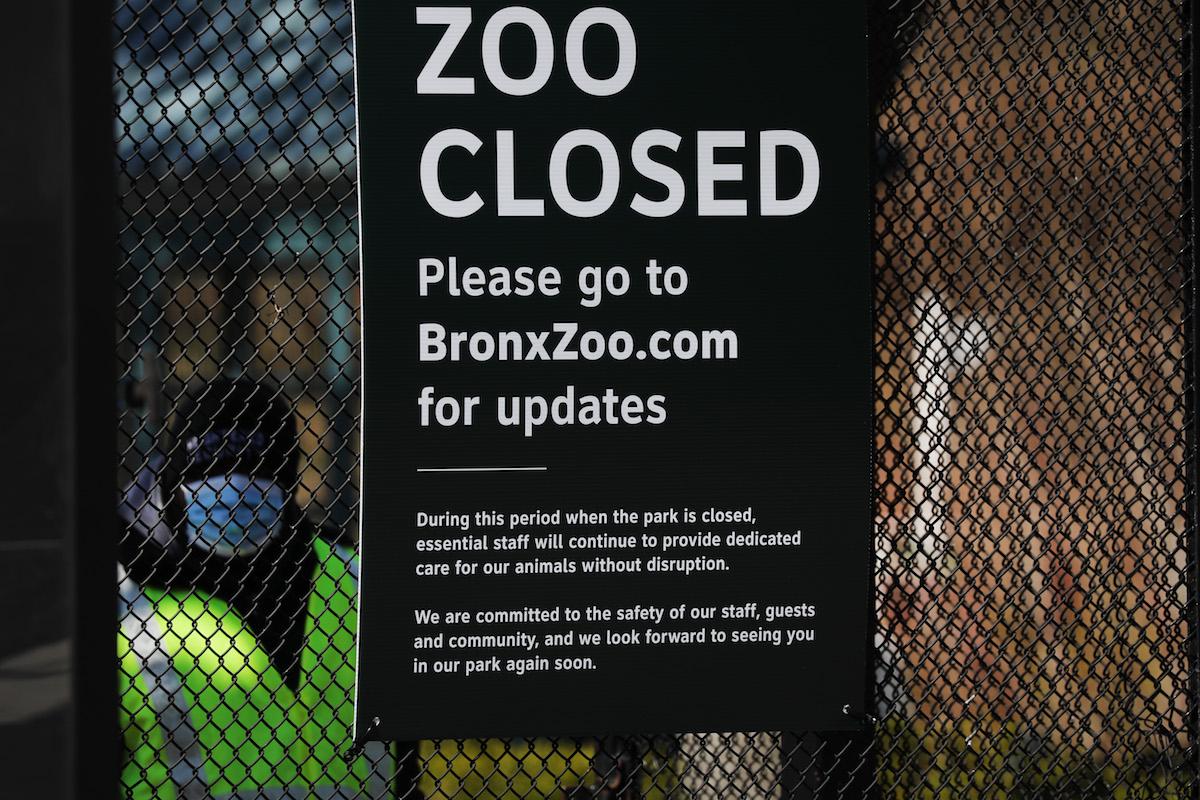Tiger Tests Positive for COVID-19 at the Bronx Zoo
At New York City’s Bronx Zoo, a tiger has been diagnosed with the novel coronavirus.
Updated April 6 2020, 2:25 p.m. ET

A Malayan tiger cub in its enclosure at the Bronx Zoo on April 27, 2017 in the Bronx, New York.
For the first time since Tiger King dropped on Netflix, Joe Exotic’s tigers are not the most-talked about on the internet. At New York City’s Bronx Zoo, a tiger has been diagnosed with the novel coronavirus.
The Bronx Zoo shared a press release on Sunday, April 5 announcing that Nadia, a four-year-old Malayan tiger, had tested positive for COVID-19. Her test was sent to the USDA’s National Veterinary Services Laboratory in Iowa, who confirmed the results.
Nadia is the only big cat who the zoo tested — but it’s likely that several others have the virus as well. In addition to Nadia, her sister Azul, two Amur tigers, and three African lions are all experiencing a dry cough and decreased appetite. Otherwise, the animals in question are all exhibiting typical symptoms for big cats (in captivity, at least), and the zoo expects all seven lions and tigers to fully recover.
“We tested the cat out of an abundance of caution and will ensure any knowledge we gain about COVID-19 will contribute to the world’s continuing understanding of this novel coronavirus,” the zoo said in a statement, noting that the team will continue to monitor them closely.

A guard stands at the entrance to the Bronx Zoo on April 06, 2020 in New York City. A tiger at the zoo has tested positive for COVID-19, the Wildlife Conservation Society said in a statement Sunday.
Paul Calle, chief veterinarian at the Bronx Zoo, told Reuters that Nadia was the only animal they tested because she was experiencing the most severe symptoms. The vets had to give Nadia anesthesia to perform the test, and they did not want to have to give the others anesthesia as well.
“This is the first time that any of us know of anywhere in the world that a person infected the animal and the animal got sick, Calle told Reuters. “Hopefully we will all have a better understanding as a result.”
The Bronx Zoo has been closed to the public since March 16 — so how did Nadia contract the coronavirus? According to the zoo, an employee infected the cats.
“Our cats were infected by a person caring for them who was asymptomatically infected with the virus or before that person developed symptoms,” the zoo said in a statement. “Appropriate preventive measures are now in place for all staff who are caring for them, and the other cats in our four WCS zoos, to prevent further exposure of any other of our zoo cats.”
While there have been other reported cases of animals contracting COVID-19 — for example, a cat in Belgium and a dog in Hong Kong both tested positive for the virus — this case marks the first known instance of a human infecting an animal with the virus in the U.S.
Can pets get the coronavirus?
Pet parents reading this may be wondering if they should worry about giving their dogs or cats the coronavirus — or, if their dogs or cats can spread the coronavirus to humans. According to the CDC, there is no evidence in the U.S. that animals could be a source of COVID-19.
“However, because all animals can carry germs that can make people sick, it’s always a good idea to practice healthy habits around pets and other animals,” the CDC says. Those habits include washing your hands after handling animals, their waste, food, and more; properly clean up after your pets; consult with your veterinarian should your animal show any symptoms of the coronavirus; and continue consulting the CDC’s guidelines regarding safe animal care during the pandemic.
The best way to prevent contracting or spreading coronavirus is with thorough hand washing and social distancing. If you feel you may be experiencing symptoms of coronavirus, which include persistent cough (usually dry), fever, shortness of breath, and fatigue, please call your doctor before going to get tested. For comprehensive resources and updates, visit the CDC website. If you are experiencing anxiety about the virus, seek out mental health support from your provider or visit NAMI.org.